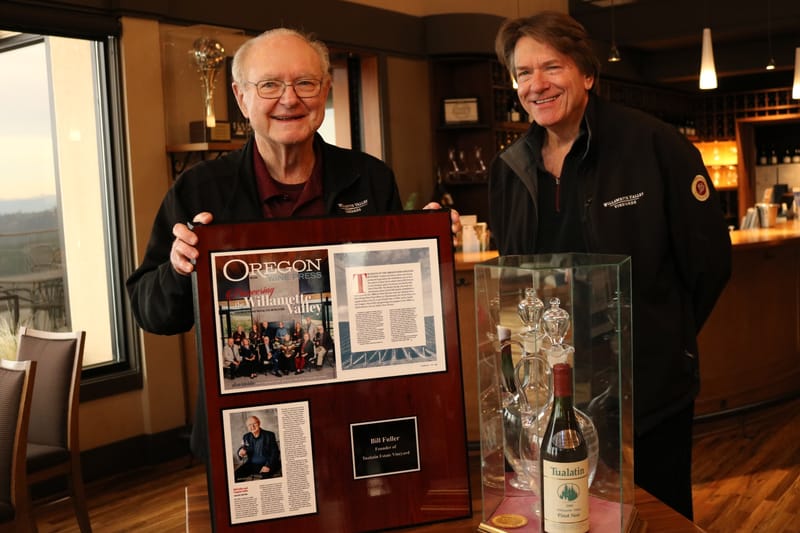Mike Grgich, Crafted Chardonnay that Won 1976 Judgment of Paris
Mike Grgich obiturary
Miljenko “Mike” Grgich, whose Chardonnay won the 1976 Judgment of Paris and established American wine as equal to any in the world, has died. He was 100.
Born in Desne, Croatia, to a winemaker, had planned to be a shopkeeper, but World War II came along exposing Grgich to the harrowing experiences of that war. When the war ended, he decided to follow his father and become a winemaker.
With the advent of communism, Croatia became part of Yugoslavia, and Mike went to the University of Zagreb to study enology and viticulture.
There he learned, in whispered conversations with a professor, of a faraway place the man described as “paradise” — California. As life under communist rule became increasingly oppressive, Mike decided he would venture to California. With a few American dollars hidden in his shoe and a suitcase filled with his winemaking books, he engineered an escape through a United Nations agricultural exchange program with Germany. He had not finished his degree, he said, or he should never have been allowed to leave the country. He left doubting he would ever see his homeland again.
While in Germany, he was granted asylum in Canada by agreeing to be a lumberjack in British Columbia. He traveled by ship and train to take a job that ultimately would not materialize. Instead, he worked as a dishwasher, dreaming of “paradise” and how he might find his way.
A response to an ad resulted in a job offer from Lee Stewart, founder of Chateau Souverain and one of the pioneers of Napa Valley’s post-Prohibition wine renaissance. In 1958, four long, lonely years after he had left Croatia, Mike arrived in St. Helena, California, where he would begin his impressive career as a Napa Valley winemaker.
While working for Stewart, Mike met another immigrant from Europe, André Tchelistcheff, who also studied winemaking before escaping from the Soviet Union. Mike subsequently went to work with Tchelistcheff at Beaulieu Vineyards in Rutherford.
He was hired from Beaulieu by Robert Mondavi, who had just built the first new winery in Napa Valley since Prohibition. His first vintage at Robert Mondavi Winery, a 1969 Cabernet Sauvignon, was entered into a blind tasting of California cabs and was ranked #1. James Laube, wine critic for The Wine Spectator magazine, called it “possibly the best cab ever made in California.”
From Robert Mondavi, Grigch moved to a ghost winery, Chateau Montelena, in Calistoga. Jim Barrett, a Southern California lawyer, offered Gigrich shares in ownership to help him restore it and its winemaking program. Because it would take longer for a red wine to be able to go to market, Mike suggested they make a white wine.
It was his second vintage of Chardonnay that was chosen to go to Paris for a blind tasting organized by Steven Spurrier and Patricia Gallagher in celebration of the U.S. bicentennial. The results shocked the world when Mike’s Chardonnay, along with a Cabernet Sauvignon made by Mike’s Napa neighbor, Warren Winiarski of Stag’s Leap Wine Cellars, were named the top wines. “It taught the world that fine wines could be made somewhere other than France,” Winiarski said.
This success enabled Mike to finally realize his dream of owning his own winery. In partnership with Austin Hills in 1977, he founded Grgich Hills Winery (now Grgich Hills Estate Winery) in Rutherford.
The suitcase he carried to the U.S. is now at the Smithsonian Institution in Washington, D.C., along with two bottles of the famous red and white wines, which were included in the Smithsonian’s 2013 book, 101 Objects that Made America.
In 1980, after his wine was judged the best of 221 Chardonnays at a grand tasting in Chicago, he was dubbed “The King of Chardonnay.”
"I realized that you don’t make wine only with your head and your senses," he said. "You make wine with your heart."
In 1986, he helped his grand-nephew, Ivo Jeramaz, come to California, and after the fall of Communism in Eastern Europe in 1989, he was able to return to Croatia, where he finally received his university diploma.
He decided to help Croatia rebuild its wine industry, and opened a winery, Grgić Vina, making red and white wines from indigenous vines. In addition to providing scholarships for Croatian youth to become students of winemaking in the U.S., Mike also became an ardent supporter of Roots of Peace, an organization that removes landmines and restores agriculture in war-torn countries, including Croatia.
Mike guided Grgich Hills until 2018, when at age 95, he handed the leadership over to his daughter Violet, who now serves as president, and to Ivo Jeramaz, winemaker and vice-president. The two have led efforts to establish the winery in the vanguard of organic, sustainable farming.
In March of this year, he saw his winery receive its Regenerative Organic Certification, solidifying its global leadership in environmentally friendly farming practices.
In his autobiography, published in 2016, he wrote, “In my life, I have had real miracles. They were between God and me, and when I was offered one, I accepted it with all of my heart and soul, with gratitude. Be on the watch for miracles in your own life.”

